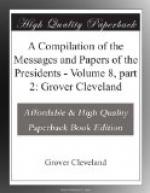Under the Constitution the President and heads of Departments are to make nominations for office. The Senate is to advise and consent to appointments, and the House of Representatives is to accuse and prosecute faithless officers. The best interest of the public service demands that these distinctions be respected; that Senators and Representatives, who may be judges and accusers, should not dictate appointments to office.
To this end the cooperation of the legislative department of the Government is required alike by the necessities of the case and by public opinion. Members of Congress will not be relieved from the demands made upon them with reference to appointments to office until by legislative enactment the pernicious practice is condemned and forbidden.
It is therefore recommended that an act be passed defining the relations of members of Congress with respect to appointment to office by the President; and I also recommend that the provisions of section 1767 and of the sections following of the Revised Statutes, comprising the tenure-of-office act of March 2, 1867, be repealed.
Believing that to reform the system and methods of the civil service in our country is one of the highest and most imperative duties of statesmanship, and that it can be permanently done only by the cooperation of the legislative and executive departments of the Government, I again commend the whole subject to your considerate attention.
It is the recognized duty and purpose of the people of the United States to suppress polygamy where it now exists in our Territories and to prevent its extension. Faithful and zealous efforts have been made by the United States authorities in Utah to enforce the laws against it. Experience has shown that the legislation upon this subject, to be effective, requires extensive modification and amendment. The longer action is delayed the more difficult it will be to accomplish what is desired. Prompt and decided measures are necessary. The Mormon sectarian organization which upholds polygamy has the whole power of making and executing the local legislation of the Territory. By its control of the grand and petit juries it possesses large influence over the administration of justice. Exercising, as the heads of this sect do, the local political power of the Territory, they are able to make effective their hostility to the law of Congress on the subject of polygamy, and, in fact, do prevent its enforcement. Polygamy will not be abolished if the enforcement of the law depends on those who practice and uphold the crime. It can only be suppressed by taking away the political power of the sect which encourages and sustains it.




